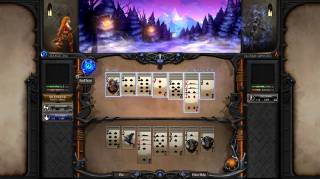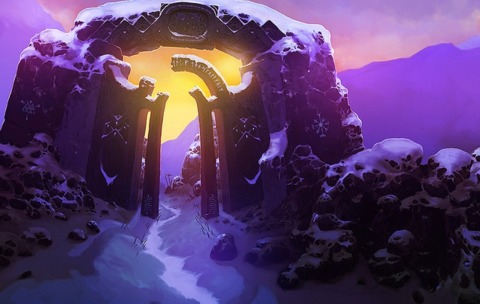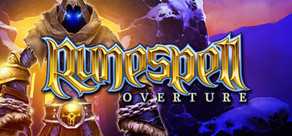A Unique Little Indie Title With a Solid Base
2011 has seen a remarkable rise in the profile and quantity of PC indie downloadable games. Services like Steam are full to bursting with them now as small teams and young minds continue to create an alternative, a counter culture to the ever increasing trend of big budget blockbuster AAA titles. Many of these indie titles attempt to separate themselves from the perpetually growing pack by featuring a unique mechanic, something people haven't seen before - or at least not for a long time.

And so we have Runespell: Overture, which is about as curious a combination of simple game mechanics as you're likely to find. The most fundamental system at play in Runespell: Overture is a battle system based on the card games of poker and solitaire. Duels take place between two combatants, both of whom have a solitaire set-up of cards, with seven face cards, and damage is dealt to the other player by arranging five cards into a standard poker hand (flush, four-of-a-kind, straight etc.) and then launching an attack. The power of the attack is determined by the value of the hand; a mere two pairs does just nine damage, whereas a full house deals fifteen damage and an ever elusive royal flush deals fifty damage.
The two players take turns, and within each turn a player can make three moves. What's interesting here is that you can steal cards from your opponent's play field in order to make combos, but there is a drawback to taking a card from their field; when you move a card in your own area, the card beneath it is instantly revealed, whereas when you take a card from your opponent's area, the card underneath is only revealed when they player ends their turn. The ability to steal cards means that there is definitely a strategic element to battle, as you both attempt to build your own poker hands while denying your opponent of cards that would be of value to them.
It's a pretty simply system to get used to, and it actually works really well. The combat is addictive and engaging, and the AI is good enough to make strategic decisions against the player without feeling unbalanced. It's not an overwhelmingly deep system, and the value of the hands is a little skewed - it's pretty easy to build a full house and it does only three points less than a four-of-a-kind - but it's a solid base for the game.
The poker-based combat is not all that Runespell has to offer. The game also features very light mechanics from role-playing games and collectable card games. It's not as simple as "well, it's Puzzle Quest but with poker instead of match-three", and actually the RPG elements of Puzzle Quest are significantly more developed, but nonetheless it's a fairly apt comparison. Runespell has a story and a world map to explore, and you play a character who gets stronger over the course of the game. However, he grows stronger not by levelling up stats, but by earning more potent abilities, which are gained from cards found in the world and awarded for completing quests.
This is where the meat of Runespell's combat is found; the game has a fairly deep collection of runespell cards, which are useful in a variety of ways, including improving the damage your attacks deal, dealing instant damage to your opponent or even earning extra moves per turn. A character can enter battle with an inventory of up to eight cards, and enemies can use runespell cards as well. However, the most common runespells are not infinitely re-usable, and you will run out of uses of a specific card. You can earn more uses for a spell, as well as new spells, from the handful of vendors found in the game. You can also sell the spell cards you don't use too much.
Essentially, the spell cards are the only way that you can customise your character, and your character's abilities are not innate; no change you make in the game is permanent. However, you will meet characters during your journey who will join your adventure and aid you in combat. Once a character joins your party, you will be given a unique ability card which has infinite uses, which means you will often equip your character with a combination of standard runespells with limited uses and companion abilities.
The runespell cards system falls woefully short of providing the game with RPG or CCG levels of depth. The cards do not seem to have varying levels of rarity, and since you can only enter battle with a certain amount of cards, there is little to no incentive to collect a lot of cards. I often find myself selling almost all my cards except for the handful or so that I took into battle with me, and I only felt a slight urge to experiment with different abilities and spells. Despite the system's shortfalls, it does certainly succeed in providing another intriguing system on top of the already entertaining combat system.

The game's presentation is built mostly on its strong visual style, which is stylised and highly colourful, and the characters and cards are mostly well designed. The game's music is present but fairly innocuous, and personally, I found that I preferred listening either to my own music or a podcast while playing the game. As mentioned, the game also has a story, which is pretty incomprehensible. It combines themes from fantasy and mythology, but is based in the real-world, specifically around 10th century Britain, and historical people and factions, such as the Norwegian king Harald Hardrada and the Byzantine Empire, are mentioned by name. The story is pretty inconsequential, and does a decent enough job of spacing out the combat, but none of the game's text is particularly interesting to read, nor any of the characters you meet particularly memorable.
Runespell: Overture is worth playing just for the sheer addictiveness of the game's compelling battles. It's a good-looking low-intensity game - you can play just with the mouse - but it has strategic depth and is engaging enough to keep you entertained, even though the story and collectable card system fail to match the strong combat. Runespell is a unique and fun experience, but it's fairly insubstantial, and the story can be experienced in around 6-8 hours. It's not a particularly memorable game, but it's good enough to fill that void in a boring or slow day. If, like me, you are sick to death of playing Solitaire or Minesweeper whenever boredom strikes, or if you want to play a truly unique low-impact indie game, Runespell: Overture is definitely worth a look, but some players would perhaps do better to pick up the game at a discounted price or as part of one of the many indie game bundles that can be found online - which is basically the downloadable indie game equivalent of saying "this game is easy to recommend as a rental but hard to recommend as a purchase".

0 Comments